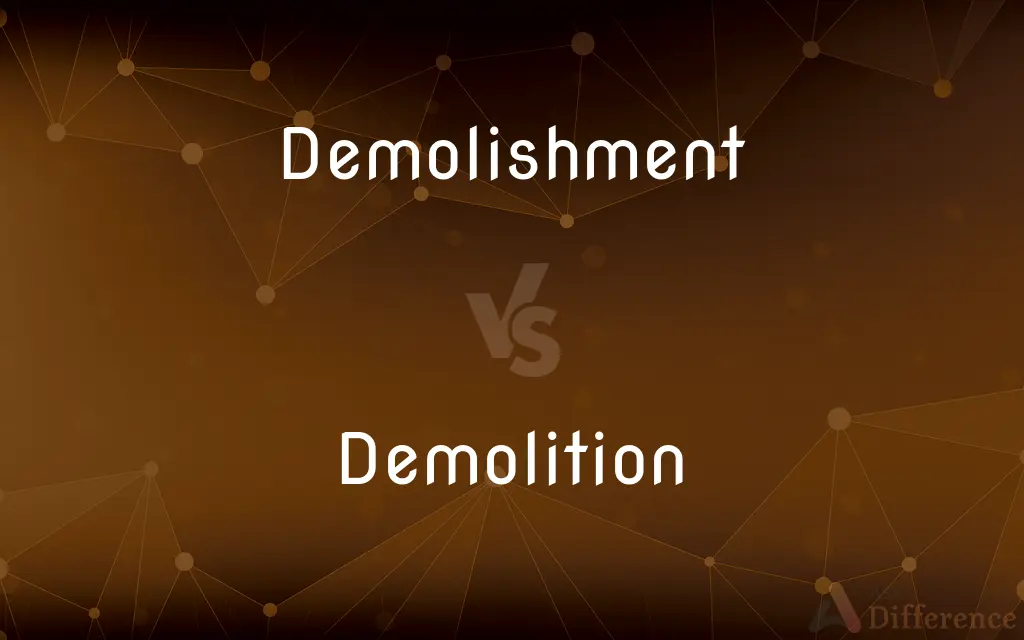Demolishment vs. Demolition — What's the Difference?
By Fiza Rafique & Urooj Arif — Updated on March 12, 2024
Demolishment is the act of tearing down, while demolition is the process of destroying structures.

Difference Between Demolishment and Demolition
Table of Contents
ADVERTISEMENT
Key Differences
Demolishment and demolition both refer to the act of destroying buildings or structures, but they are used in slightly different contexts. On the other hand, demolition is the more commonly used term, specifically referring to the process of systematically taking down buildings, structures, or other man-made constructions. It involves planning, the use of specific methods and equipment, and often, the intention to clear space for new development or to remove unsafe structures.
Demolishment emphasizes the action of tearing down or destroying, often implying a physical or forceful removal of structures. It is less commonly used in formal contexts and may appear more in casual or colloquial speech. Demolition is a term widely used in construction, urban planning, and related fields, reflecting a professional and technical process.
While demolishment might be seen as a more general or broad term that can apply to the act of destruction in various contexts, demolition is more specific and is associated with a controlled and planned process. This distinction is important in professional settings where the precision of language reflects the nature and scope of the work being undertaken.
The terminology used can also indicate the scale and method of the process. Demolition is often associated with large-scale operations that may involve explosives (for implosion), wrecking balls, and other heavy machinery. In contrast, demolishment might be used to describe smaller-scale or less technical acts of destruction, though this is not a strict rule.
In terms of regulation and safety, demolition is a term more closely associated with standards and practices. The demolition of buildings and large structures often requires permits, adherence to safety standards, and environmental considerations, such as dust control and debris disposal. These regulatory aspects underline the formal and organized nature of demolition activities compared to the more general notion of demolishment.
ADVERTISEMENT
Comparison Chart
Definition
Act of tearing down or destroying.
Process of systematically destroying structures.
Usage
Less formal, broader application.
Formal, associated with controlled and planned processes.
Context
Casual or colloquial speech.
Construction, urban planning, professional settings.
Associated Actions
May imply physical or forceful removal, not necessarily planned.
Involves planning, specific methods, and equipment.
Scale & Method
Can be used for smaller-scale or less technical destruction.
Often implies large-scale operations, sometimes using explosives.
Compare with Definitions
Demolishment
General destruction.
The storm led to the demolishment of several coastal homes.
Demolition
Subject to regulations.
The demolition project had to comply with several safety regulations.
Demolishment
Not always planned.
The accidental demolishment of the wall was a surprise to everyone.
Demolition
Planned and controlled.
The controlled demolition of the tower was a success, with no injuries reported.
Demolishment
Act of tearing down.
The old shed's demolishment was done with just a few tools.
Demolition
Uses specific methods.
The team used controlled explosives for the building's demolition.
Demolishment
Broader application.
The term 'demolishment' can apply to the destruction of concepts or structures.
Demolition
Involves heavy machinery.
Heavy machinery was brought in for the demolition process.
Demolishment
Can be less technical.
The demolishment of the makeshift barricade was quick and easy.
Demolition
Systematic destruction.
The demolition of the old factory took weeks to plan.
Demolishment
(archaic) demolition
Demolition
Demolition, also known as razing, cartage, and wrecking is the science and engineering in safely and efficiently tearing down of buildings and other artificial structures. Demolition contrasts with deconstruction, which involves taking a building apart while carefully preserving valuable elements for reuse purposes.
Demolishment
Demolition.
Demolition
The act or process of wrecking or destroying, especially destruction by explosives.
Demolition
Demolitions Explosives, especially when designed or used as weapons.
Demolition
The process of demolishing or destroying buildings or other structures.
Demolition
The act of overthrowing, pulling down, or destroying a pile or structure; destruction by violence; utter overthrow; - opposed to construction; as, the demolition of a house, of military works, of a town, or of hopes.
Demolition
An event (or the result of an event) that completely destroys something
Demolition
The act of demolishing
Common Curiosities
What is demolition?
Demolition is the process of dismantling or destroying a building or structure, typically using controlled methods.
What techniques are used in demolition?
Techniques include implosion, using a wrecking ball, and strategic dismantling.
What is demolishment?
Demolishment refers to the act of demolishing, often used in a more general or informal manner.
Are demolition and demolishment interchangeable?
While they can be used to describe similar processes, demolition is preferred in technical and professional settings.
Does demolishment imply a lack of planning or professionalism?
Not necessarily, but it is less likely to convey the detailed planning and expertise associated with demolition.
Do demolition projects consider environmental impacts?
Yes, modern demolition projects often include plans for recycling materials and reducing waste.
Why is demolition preferred over demolishment in professional discourse?
Demolition is more specific and aligned with the technical, environmental, and safety considerations of the process.
Is the choice between demolition and demolishment a matter of regional language preference?
To some extent, yes, though demolition is universally understood and preferred in formal contexts.
How do demolition and demolishment differ in usage?
Demolition is more commonly used, especially in professional contexts, while demolishment is less formal and less frequent.
Are there certifications for demolition professionals?
Yes, there are certifications and training programs for professionals in the demolition industry.
Can demolishment be used in legal documents?
Typically, demolition is the term used in legal and technical documents due to its precise nature.
How are safety concerns addressed in demolition?
Through careful planning, the use of specialized machinery, and adherence to regulations to protect workers and the public.
How do environmental regulations impact demolition projects?
They require projects to minimize environmental harm through waste management and recycling of materials.
Is demolishment a term used in construction?
While it can be understood in construction contexts, demolition is the term more commonly used by professionals.
Can demolishment refer to non-physical destruction?
It's less common, but like demolition, it can metaphorically describe the thorough defeat or ruin of something.
Share Your Discovery

Previous Comparison
Dedication vs. Love
Next Comparison
Reshoot vs. ReshotAuthor Spotlight
Written by
Fiza RafiqueFiza Rafique is a skilled content writer at AskDifference.com, where she meticulously refines and enhances written pieces. Drawing from her vast editorial expertise, Fiza ensures clarity, accuracy, and precision in every article. Passionate about language, she continually seeks to elevate the quality of content for readers worldwide.
Co-written by
Urooj ArifUrooj is a skilled content writer at Ask Difference, known for her exceptional ability to simplify complex topics into engaging and informative content. With a passion for research and a flair for clear, concise writing, she consistently delivers articles that resonate with our diverse audience.














































